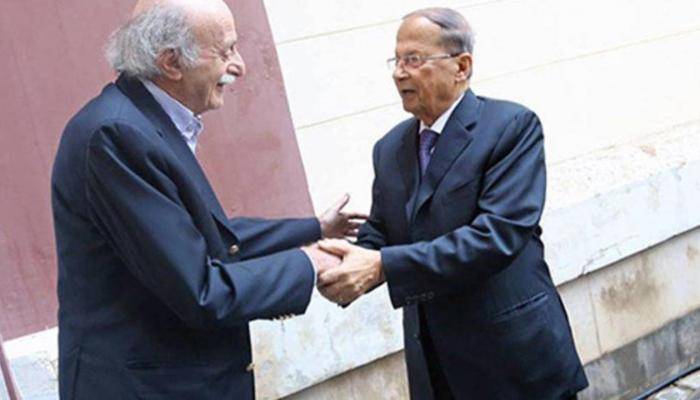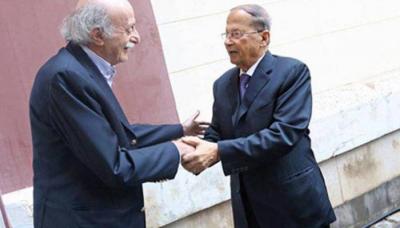It was not easy for the President of the Progressive Socialist Party, Walid Jumblatt, to choose to elect the general from Rabieh as president at Baabda Palace. However, he reluctantly decided to vote for him for the party-affiliated MPs, leaving the independent members of the bloc free to choose. Yet, the repetition of the voting process three times during the election session of Michel Aoun "revved him up," known for his sarcastic style, prompting him to send a message at the start of the new era, no less shrewd than his description of Aoun’s return from Paris as a "tsunami," selecting as president of Lebanon from the shelves of his library and voting for the Greek adventurer "Zorba."
In the initial months of the era, the relationship was positive, as Jumblatt felt he had opened a new page with Aoun and participated in the first and second governments of Saad Hariri. However, the already missing chemistry between the two began to show in their relationship. Jumblatt did not hide his opinion, summarizing his view of the era as "a failed era from the very first moment."
Tensions began to manifest between the Progressive Socialist Party and the Free Patriotic Movement, both inside and outside the government. The electricity file was at the forefront of the issues that the "Socialist" consistently raised, criticizing the way the Movement's ministers managed the energy ministry, from the power ships to the absence of a regulatory authority and the waste in the sector. The "Socialist" held several conferences on this matter. The same disagreement extended to issues of justice, displaced persons, appointments, relations with Arab countries, and others.
However, the tension reached its peak between the Socialist Party, the Movement, and the era on the eve of the 2018 elections, which took place for the first time under the proportional law. Sectarian rhetoric emerged, with speeches from Movement leader Gebran Bassil causing significant tension on the streets and among supporters of both parties, especially those reminding of the mountain war and the 1860 war, targeting the mountain reconciliation and claiming that political and factual return had not yet been accomplished. The response always came from the "Socialist," labeling him a "grave digger" and attacking the historical reconciliation between Jumblatt and Patriarch Mar Nasrallah Boutros Sfeir.
The tension between the two sides continued to reflect a disagreement within the Druze community, amid the alliance between the Free Patriotic Movement and the Democratic Lebanese Party and the announcement of the Unity of the Mountain list, which included members from the Strong Lebanon Bloc along with MP Talal Arslan.
This unhealthy relationship saw "ups and downs," and despite the tense atmosphere between them, efforts succeeded in holding a mass for penance and forgiveness at Our Lady of the Hill in Deir el Qamar on March 23, 2019, in an attempt to ease tensions or, from Jumblatt's perspective, to involve the "Movement" in mountain reconciliation even if it wasn't a part of the warring parties that necessitated reconciliation in 2001. However, even in this occasion, the "reconciliation" did not fulfill its purpose. While Jumblatt focused on calmness and closing the chapter of war without reopening old wounds, as everyone participated in that war and no one could be absolved, recounting the details of what happened on the night of Kamal Jumblatt’s assassination in 1977, Bassil repeated his previous rhetoric that the true political return to the mountain would only happen after the last elections. He made a notable statement about penance and forgiveness, considering that forgiveness is granted to the penitent. Thus, practically, this occasion was as if it had never happened.
Neither penance nor forgiveness redeemed this strained relationship between the "Socialist" and the "Movement," and just three months later, it exploded this time in the streets, with the Qabrshmoun incident on June 30, 2019, leading to national repercussions and a cabinet paralysis as well as local crises in the mountain area. Tension peaked on the shores of Qabrshmoun, marking the war that did not erupt and the embers ready to ignite at the first hint of a storm.
The restlessness persisted until August 9, when a meeting took place at Baabda Palace, described as a reconciliation meeting following Qabrshmoun, which included President Aoun, President Nabih Berri, alongside Jumblatt and Arslan. It served as a political closure for the Qabrshmoun phase, even though the social wound had not yet healed.
The honeymoon days with Aoun continued when the latter moved to the summer residence in Beiteddine, where Jumblatt visited him and invited him to Mukhtara. However, Aoun did not respond to the invitation nor visit Mukhtara as President throughout the six years, unlike all previous presidents who were accustomed to visiting the palace after moving to Beiteddine.
The atmosphere of the political summer did not last long, and tension between the two parties resumed as the Mukhtara leader raised the banner of overthrowing the failed era. The image of MP Taymour Jumblatt alongside Bassil in Laklouk in September of the same year did not offer absolution, as the "Socialist" escalated the tone of its political rhetoric, warning of the collapse of the state and economy, and calling for the ouster of Aoun. Jumblatt called for a massive rally for the Progressive Youth Organization on October 14, in which all "Socialist" MPs and other political leaders participated, highlighted by a fiery speech from MP Wael Abu Faour in Martyrs' Square, attacking the era and Aoun.
Three days later, the scene turned upside down after the eruption of the popular uprising on October 17. The pulse of the grassroots base in the "Socialist" was still in the streets following the Beirut march, and Jumblatt nearly decided to resign from the government, only to hesitate, waiting for Prime Minister Saad Hariri's position, who announced the full resignation of the government.
After October 17, the collapse of the lira and the economy, and the arrival of the COVID-19 pandemic, the parameters changed, initiating a pivotal phase in the country’s history. Political battles receded in favor of battles for bread, medicine, fuel, and deposits.
The relationship between Clemenceau and Baabda was not at its best, but the time was no longer for political wars. Jumblatt visited Baabda in May 2020 after a mediator's entry, which came after fierce exchanges between the two parties, also involving Prime Minister Hassan Diab. He also visited him in March 2021, where the economic file was the prominent issue, releasing an important statement calling for maintaining the French initiative at that time.
"A cold spring, a hot spring," is how this relationship can be described throughout six years of the era. The six years were largely comprised of wars and trench warfare between the two sides, clearly reflecting in the 2022 elections, which Jumblatt contested against what he termed the resistance axis, referring to Hezbollah and the Free Patriotic Movement.
It is true that the era is closing with a historic agreement for demarcating borders and an attempt to make progress on the displaced file, yet the "Socialist" insists, despite a delegation from the Movement landing in Clemenceau a few days ago, on spoiling the achievements that he termed illusory, warning against squandering Lebanon's oil wealth without a sovereign fund. "This era was catastrophic," Jumblatt described it in his last media appearance, stating: "Aoun's era produced nothing but disasters; the era is over... we have no choice but to wait in the hope of being provided with an acceptable president and to avoid another catastrophe from his entourage." The relationship between Jumblatt, the Free Patriotic Movement, and the era is indeed intriguing, with reconciliations quickly followed by disputes. The missing chemistry has been unable over the past six years to be established, if not severed all remaining ties between them.




